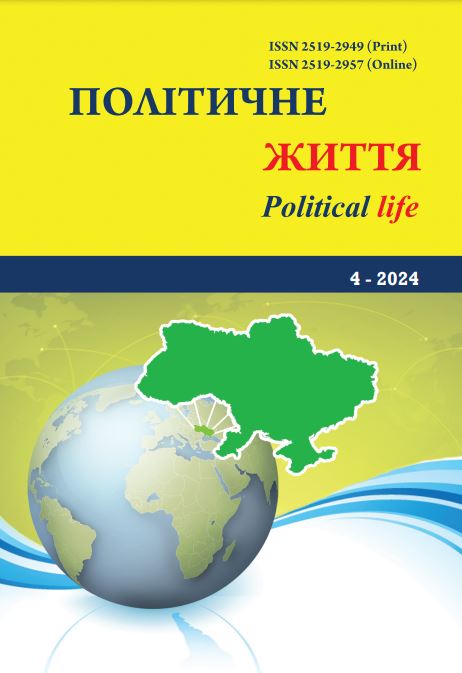The role of the social networks in the political process: positive ta negative consequence
DOI:
https://doi.org/10.31558/2519-2949.2024.4.7Keywords:
political internet space, social media, social networks, political process, political communication, political manipulationAbstract
Social networks are an integral part of the modern Internet space. The Internet space, in turn, acts as a powerful tool of influence, which has pronounced social and political consequences. In addition, it promotes the development of new forms of communication, including political. Let us emphasize that the role of social media in politics is constantly growing compared to traditional mass media. Each of the popular social networks currently has more than a million users and their number is constantly increasing. It is not surprising that political figures are gradually joining media personalities active in social networks. Today, it is difficult to imagine a famous foreign or domestic politician who would not have a page on social networks. Note that social networks act as an important component of the modern political space and become one of the main tools of communication between the political elite and civil society. On the other hand, social networks have become an effective tool of foreign and domestic political PR-campains, they are deliberately used by political elites to influence the consciousness and behavior of voters. Therefore, the study of their role in the political process, as well as the consequences of their use, is becoming increasingly relevant. We note that social networks have permanent positive characteristics, namely: low entry threshold, speed of information transmission, lack of space-time boundaries of interaction, etc. At the same time, the use of social networks has pronounced negative consequences: the transformation of real politics into a symbolic one, the spread of negative or false information, political manipulation, trolling, bot farms, etc., and their active use complicates the process of rational awareness of political reality. Let us emphasize that the democratization of the political process does not mean a complete lack of control over the information that is distributed through social media. Therefore, today we should talk not so much about the growing role of social networks in the political process, but about its social and political consequences.
References
Афанасьєва К. Медіаконтент: шляхи протистояння викликам цифрової епохи (досвід Швеції). Наукові записки Інституту журналістики. 2013. Т. 50. С. 251–254.
Була С. Соціальні мережі як інструмент політичної маніпуляції. НЖ «Політикус». 2020. Вип. 4. 21-25. URL: http://politicus.od.ua/4_2020/5.pdf
Воротинський В.В. Інтернет як простір політичного впливу та маніпулювання. Вісник Національного університету «Юридична академія України імені Ярослава Мудрого» 2015. № 4 (27).
Горбенко Н. Постправда як феномен сучасної політики. Education and science of today intersectoral issues and development of sciences. 2021. Vol. 3. С. 23–27.
Гоцур О. Соціальні мережі і політичний PR в українських та закордонних виборчих кампініях. Вісник Національного університету “Львівська політехніка”: журналістика. 2021. №2 (2). 53-57.
Данько Ю. Соціальні мережі як засіб політичної комунікації. EUROPEAN POLITICAL AND LAW DISCOURSE. 2015. Volume 2. Issue 2. C. 204-209.
Олефір І. Індустріальне та інформаційне суспільство: моделі трансформації. Український науковий журнал «Освіта регіону». URL: https://social-science.uu.edu.ua/article/1416
Радченко О. Роль інтернет-комунікацій в політичній взаємодії в Україні. Автореферат. Одеса, 2012. URL: https://core.ac.uk/download/pdf/50594656.pdf
Сидоров М., Табаков Д. Інтернет як засіб соціальної комунікації та соціального впливу. 2018. URL: https://ipiend.gov.ua/wp-content/uploads/2018/07/sydorov_internet.pdf.
Чеканова П. Social networks as a tool of political manipulation and propaganda. Polit. challenges of science today. International relation. Abstracts of XXI International conference of higher education students and young scientists, Kiev, 2021, 103-105. URL: http://fmv.nau.edu.ua/wp-content/uploads/2021/04/%D0%9F%D0%BE%D0%BB%D1%96%D1%82-2021.pdf#page=103
Чижова Н. Інтернет як комунікативний та соціальний простір інформаційного суспільства. 2013. URL: https://enpuir.npu.edu.ua/bitstream/handle/123456789/4975/Chyzhova.pdf;jsessionid=006A304A379129AAC8FD5E45B5421909?sequence=1
Янченко А. Соціальні медіа як елемент політичної комунікації. Політичний менеджмент. 2023. №1. C. 153-157.
Castells M. Information Technology, Globalization and Social Development. UNRISD Discussion Paper. 1999. N. 114. URL: https://cdn.unrisd.org/assets/library/papers/pdf-files/dp114.pdf
Castells M. Communication Power. Oxford: Oxford University Press. 2009.
Farrell G. The Consequences of the Internet for Politics. Annual review of political science. 2012. Vol.15. URL: https://www.annualreviews.org/content/journals/10.1146/annurev-polisci-030810-110815
Jetter М., Ullrich K., Ecker Н. Using the president’s tweets to understand political diversion in the age of social media. https://www.nature.com/articles/s41467-020-19644-6#Sec1
Kersting, Norbert. Online Participation: From “Invited” to “Invented” Spaces. International Journal of Electronic Governance. 2016. N. 6 (4). 270-280.
Luengo, Oscar. Political Communication in Times of Crisis. Berlin: Logos Verlag. 2016.
Meraz, Sharon. Is there an Elite Hold? Traditional Media to Social Media Agenda Setting Influence in Blog Networks. Journal of Computer-Mediated Communication. 2016. N. 14 (3). 682-707.
Zhuravskaya E., Petrova M., Enikolopov R. Political Effects of the Internet and Social Media. Annual review of political science. 2020. URL: https://www.annualreviews.org/content/journals/10.1146/annurev-economics-081919-050239

